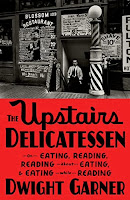Monday, November 27, 2023
Review: Daughters of Shandong (by Eve J. Chung)
Friday, November 24, 2023
Review: The Upstairs Delicatessen (by Dwight Garner)
This interesting memoir from New York Times book critic Dwight Garner came out last month and while it initially wasn't on my radar at all, I decided to pick it up when I saw what the book was about: reading and eating (perfect timing for Thanksgiving!). In this memoir, Garner writes about his "upstairs delicatessen" (a term borrowed from critic Seymour Krim) which refers to his memories involving his two lifelong passions — "reading about eating" and "eating while reading" (what a fantastic title/subtitle!!). Divided into 5 chapters (aptly titled Breakfast, Lunch, Shopping, Drinking, Dinner) plus an Introduction and Interlude, Garner writes enthusiastically about his experiences with his "twin joys" of reading and eating, but more than that, he also compiles for us a full-to-the-brim cornucopia of food (and eating) references and quotes from his broad range of reading over the years (his reading runs the gamut from books, poems, short story collections, essays, magazine and newspaper articles, etc.). Some of the writers and works he mentions are well-known, others I've honestly never heard of, but regardless of whether I was familiar with the works or not, it was still a lot of fun to read.
Literary references aside though, I also enjoyed reading about Garner's life and his "food adventures" growing up in West Virginia and Florida. I found the section where he talks about his relationship with his wife Cree especially fascinating given their completely opposite food-related backgrounds — she comes from a family of "food connoisseurs" (chefs and restaurant owners) who were all about fresh ingredients and growing their own food (he mentions that his wife grew up bringing leftover frog legs to school for lunch), while he comes from a working class family that pretty much ate whatever they found around the house (i.e.: bread laden with mayonnaise and cheese slices, potato chips, some red drink from powder mix, etc.). Despite these differences, their relationship not only works, but thrives — Garner relays their family's "quirkiness" in relation to food with such affection and humor, which I really appreciated.
Overall, this was a fun, delightful read that I highly recommend — though words of warning that some of the food that Garner describes as having eaten might make you feel queasy (personally, I will admit to feeling a tad grossed out when I read about the famous "peanut butter and pickle sandwich" that Garner describes his dad making for him, but that's mainly because I dislike pickles). With that said, the sheer volume of food-related anecdotes that he gathers in here is impressive, so if anything, picking this one up for those nuggets alone was well worth my while.
Monday, November 20, 2023
Review: A Man of Two Faces (by Viet Thanh Nguyen)
Saturday, November 11, 2023
Review: The Art of Gathering (by Priya Parker)
Tuesday, November 7, 2023
Review: The House of Doors (by Tan Twan Eng)
Saturday, November 4, 2023
Review: Wuthering Heights (by Emily Brontë)
Thursday, November 2, 2023
Review: Jane Eyre (by Charlotte Brontë)
This is a novel that's powerful and poignant and upon each re-read, it has the ability to make me feel as though I'm on an emotional roller coaster ride, experiencing the ups and downs of Jane's life as though I were right there beside her (and the ending moves me to tears EVERY.SINGLE.TIME). Most significantly, it's not often that I encounter a novel where I feel every element (from the writing to the characterization to the execution of the story, etc.) is done pretty much flawlessly – well, this novel definitely occupies one of the top spots on my "epitome of perfection" list.
Unlike my other reviews, I intend to keep this one relatively short — partly because this novel has been so widely read and studied (and everyone knows the story already) that I feel there's nothing really I can say in a review that will add much to the conversation (or do justice to the brilliance of the novel). With that said though, there's actually a personal reason why Jane Eyre has particular meaning for me. The first time I read the novel was back in junior high, when it was assigned reading in my English class, alongside another famous novel: Jane Austen's Pride and Prejudice. I was already an avid reader at the time, but mostly of books that I chose myself for "leisure" reading; in essence, these two novels would be my first true exposure to "classics" — but unfortunately I had heard so many "horror stories" about what the experience of reading classics would be like (ie: boring, irrelevant, too daunting, etc..) that I was honestly a bit put off. But I persisted of course, and ended up falling in love with both novels — so much so that they (both novels) instilled in me a subsequent love for studying classics, but more importantly, they ignited the spark in me that made me realize I wanted to pursue writing creatively. To this latter point, after reading both novels, I was inspired to try writing a short story that combined elements from both (which, to my surprise, ended up winning a writing contest that year). Since then, both JE and P&P have become mainstays in my life — two novels that I re-read consistently and will forever remain "favorites of all time" for me.






